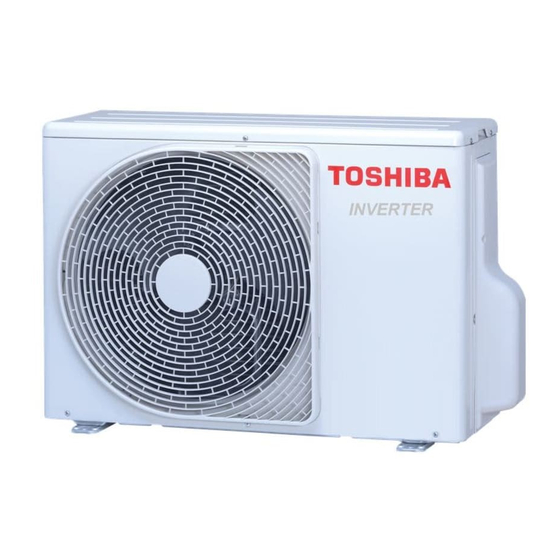Toshiba 16G3KVSG-E Installationshandbuch - Seite 13
Blättern Sie online oder laden Sie pdf Installationshandbuch für Klimagerät Toshiba 16G3KVSG-E herunter. Toshiba 16G3KVSG-E 20 Seiten. Air conditioner (split type)

Evacuating
After the piping has been connected to the indoor unit, you can perform the
air purge together at once.
AIR PURGE
Evacuate the air in the connecting pipes and in the indoor unit using a
vacuum pump. Do not use the refrigerant in the outdoor unit.
For details, see the manual of the vacuum pump.
Using a vacuum pump
Be sure to use a vacuum pump with counter-fl ow prevention function so
that inside oil of the pump does not fl ow backward into pipes of the air
conditioner when the pump stops.
(If oil inside of the vacuum pump enters the air conditioner, which use
R32 or R410A refrigeration cycle trouble may result.)
1. Connect the charge hose from the manifold valve to the service port of
the packed valve at gas side.
2. Connect the charge hose to the port of the vacuum pump.
3. Open fully the low pressure side handle of the gauge manifold valve.
4. Operate the vacuum pump to start evacuating. Perform evacuating for
about 15 minutes if the piping length is 20 meters. (15 minutes for
20 meters) (assuming a pump capacity of 27 liters per minute)
Then confi rm that the compound pressure gauge reading is –101 kPa
(–76 cmHg).
5. Close the low pressure side valve handle of the gauge manifold valve.
6. Open fully the valve stem of the packed valves (both gas and liquid sides).
7. Remove the charging hose from the service port.
8. Securely tighten the caps on the packed valves.
Compound pressure gauge
–101 kPa
(–76 cmHg)
Handle Low
Charge hose
Connecting pipe
Packed valve at gas side
Service port (Valve core (Setting pin))
Packed valve at liquid side
CAUTION
KEEP IMPORTANT 7 POINTS FOR PIPING WORK.
(1) Take away dust and moisture (inside of the connecting pipes).
(2) Tighten the connections (between pipes and unit).
(3) Evacuate the air in the connecting pipes using a VACUUM PUMP.
(4) Check gas leak (connected points).
(5) Be sure to fully open the packed valves before operation.
(6) Reusable mechanical connectors and fl ared joints are not allowed
indoors. When mechanical connectors are reused indoors, sealing
parts shall be renewed. When fl ared joints are reused indoors, the
fl are part shall be refabricated.
(7) Don't operate air conditioner in case no refrigerant in the system.
Pressure gauge
Manifold valve
Handle High
(Keep full closed)
Charge hose
Vacuum pump adapter for
counter-fl ow prevention
Vacuum
pump
Packed valve handling precautions
Open the valve stem all the way out, but do not try to open it beyond the
stopper.
Pipe size of Packed Valve
12.70 mm and smallers
1
5
8 .
8
m
m
Pump down process
1. Turn off the Air Conditioner system.
2. Connect the charge hose from the manifold valve to the service port of
the packed valve at gas side.
3. Turn on the Air Conditioner system in cooling operation more than
10 minutes.
4. Check the operating pressure of the system should be normal value.
(Ref. with product specifi cation)
5. Release the valve rod cap of both service valves.
6. Use the Hexagon wrench to turning the valve rod of Liquid side fully
close. (*Make sure no entering air into the system)
7. Continue operate Air Conditioner system until and the gauge of manifold
dropped into the range of 0.5 - 0 kgf/cm²
8. Use the Hexagon wrench to turning the valve rod of Gas side fully close.
And turn off the Air Conditioner system immediately thereafter.
9. Remove the gauge manifold from the service port of the packed valve.
10. Securely tighten the valve rod cap to the both service valves.
CAUTION
Should be check the compressor operating condition while pumping
down process. It must not any abnormal sound, more vibration.
It is abnormal condition appears and must turn off the Air Conditioner
immediately.
Securely tighten the valve cap with torque in the following table:
Cap
Valve Rod Cap
Service Port Cap
Service Port Cap
11
Size of Hexagon wrench
A = 4 mm
A
=
5
m
m
Cap Size (H)
Torque
14~18 N·m
H17 - H19
(1.4 to 1.8 kgf·m)
33~42 N·m
H22 - H30
(3.3 to 4.2 kgf·m)
8~12 N·m
H14
(0.8 to 1.2 kgf·m)
14~18 N·m
H17
(1.4 to 1.8 kgf·m)
Hexagon wrench
is required.
A
H
Valve Rod Cap
